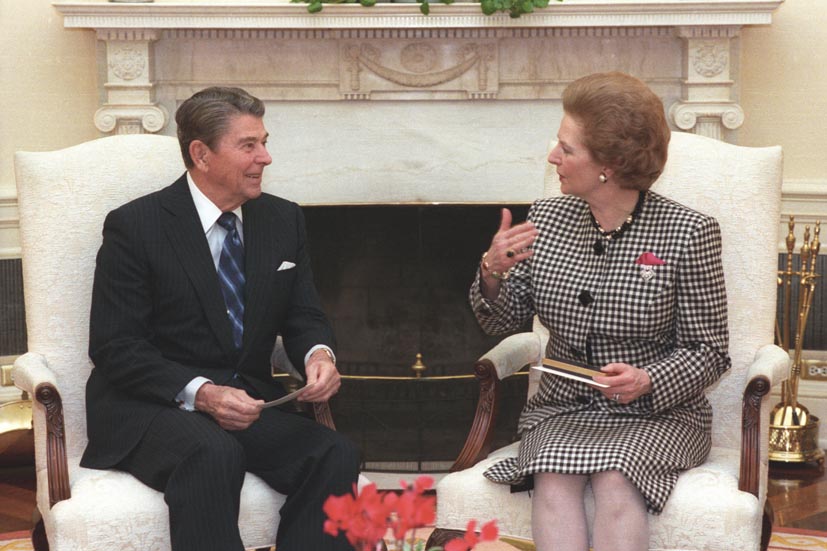Margaret Thatcher, Reaganomics, and Our Taxes

The sun finally appeared in London this morning as the city prepares for Baroness Margaret Thatcher’s funeral on Wednesday. Today, London is a bustling economic center within the European Union with low inflation, high employment, and a strong monetary system in place, a stark contrast from its 70s past as it barely survived the darkest economic period in modern British history. In the 1970s the UK was known as the sick man of Europe with an inflation rate of 13% against the United States’ 4% and Germany’s 5%. Today, it thrives as the realization of much of the Iron Lady’s dreams for her country.
Baroness Thatcher’s foremost achievement, as many of her opponents will readily admit, was to reverse Britain’s direction of economic decline. A supply-side economy believer, Thatcher’s 1983 government won a landslide victory insisting that it could no longer be an entitlement and welfare provider; these would be left to the open markets.

Her accomplishments were many, though at a significant cultural cost to Britain’s love of its Labor party. When Thatcher left office in 1990, the UK was left with a more open, thriving, and entrepreneurially driven society. The living standard for all Brits rose, taxes were lowered, threat of labor strikes greatly reduced, and the UK experienced productivity and GDP increases. Foreign investors flocked into the UK, and specifically the City of London, to invest in privatization with the booming economy providing greater overall opportunities.
The UK quickly shifted from a Socialist-themed country dominated by policies designed to increase demand, to one that emphasized supply-side economics. Central to this shift, taxes were cut, especially for those in the higher income bracket. As Baroness Thatcher saw it, “The problem with Socialism is that eventually you run out of other people’s money.”
Interestingly, many here in the UK seem to loathe her rather than love her, as evidenced by the Wizard of Oz’s “Ding, Dong, the Wicked Witch Is Dead” tune rising to #1 on the charts. It would seem that Thatcher is respected but not necessarily liked by UK’s Labor Union countrymen.
So, with this as a backdrop, I draw many parallels to our own U.S. economy and its snail-like recovery pace, and certain aspects of Ronald Reagan’s supply-side economic recovery program, i.e., Reaganomics.
When Reagan came into office in 1981, our inflation rate had risen to 13.5% and our economy, like the UK’s, was in a dismal state. He inherited the worst economy in modern American history, in fact, since the Great Depression of the 1930s. As 1988 ended along with Reagan’s administration, our inflation rate had dropped to 4.1%, yet many Americans, like the Brits, appeared to support the socialist “welfare state concept. Over the years, Reaganomics may have lost its relevance – but that does not mean it is not relevant today.
Despite 5 years of massive fiscal stimulus in the U.S. and the Fed’s ongoing money-printing, our economy remains weak with unemployment being the major economic culprit along with the rising deficit; and with government spending, chiefly for entitlement programs, at an all time high and the pending need for federal tax increases.
The acclaimed Stanford University economist Milton Friedman notes that “When the quantity of money increases at a decidedly faster rate than output over any extended period, the result is inflation. The more rapidly the quantity of money increases, the higher the inflation.”
Why have Obama’s economic policies failed to put us on a solid path to recovery? Fundamentally, the issues are intertwined with our federal tax system and excessive government spending. The US Treasury’s IRS tax code is 68,000 pages and currently geared to diminish the size of your paycheck. At the root is America’s tax code, an outdated archaic mess, having grown to become an unwieldy and ineffective bureaucratic institution. The code is needlessly complex because of deductions, credits, exceptions, endless loopholes and providing special treatment for a few. The tax code contributes to our government’s massive size as a result of this burden of administering its complexity and its ongoing revisions and enforcement. It’s no wonder that folks are up in arms, both our citizenry and legislators.
Resolving the tax-code issue would actually have a very positive affect on the deficit by lowering the Treasury’s operating overhead significantly, eliminating the massive special interest credits/expense and increasing the revenue inflow. President Reagan recognized the need and validity of this approach back in 1981 when he proposed the Economic Recovery Tax Act (ERTA), the Reagan tax cuts, a 25% across-the-board decrease in personal marginal tax rates. Even with the then-massive cold war military expense buildup, and the dilution of the Act as it cleared Congress, the Reagan tax cuts showed that reducing excessive tax rates stimulates economic growth, reduces tax-evasion and tax-avoidance schemes, and can actually increase tax revenues from the rich. Unfortunately some of Reagan’s policies resulted in a few “earmark” tax loopholes which were incorporated into the tax code that favored special corporate interests, giving them more accounting wiggle and less oversight. Following Enron and Worldcom’s financial disasters, those loopholes were corrected.
As to the misguided notion that 99% of Americans support 1% of the rich in tax payments, the truth can be found by Googling “Who pays federal income tax?” A link to the National Taxpayers Union displays the actual stats: The top 1% of the wealthiest income earners pay 38% of U.S. tax revenues, the top 5% pay 59%, the top 10% pay 70%, the top 25% pay 86%, the top 50% pay 97.3% and the bottom 50% pay 2.7% of all federal tax revenues. The largest share of the tax burden is shouldered by top 5% of the wealthiest Americans who are paying well over half of the federal income tax revenues, while the poor pay virtually nothing in federal income taxes.
If you take a further investigative look it becomes clear that once federal spending is taken into consideration, those “1% of wealthiest Americans” are paying vastly more into government and consuming virtually nothing, while the bottom 50% receive the largest amounts of that spending and paying virtually no federal tax. Those are the facts.
We absolutely need tax reform that is fair, simplified, flat, and easy to understand and administer. I calculate that the realistic flat tax number is 15%. We need to collect such a flat tax from all U.S. citizens above the poverty line, eliminating income taxes for those below the poverty line, drastically reducing entitlements, and lowering the corporate tax rate so that the U.S. can regain its competitiveness in the global markets while reducing our unemployment. The most effective and fastest method of stimulating the economy is through investing in the creation of small businesses and support of innovation. A flat-tax system goes a long way in making this happen.
And, of course, we need more employed taxpayers on the payroll. Excessively high tax rates are actually counterproductive and result in de-incentivizing capital investments (key to employment growth), which in turn suppresses governmental tax revenues. Simply put, tax cuts are absolutely key to job creation. Job creation and low unemployment are key to consumer confidence. All of which are key to economic recovery. Tax increases, ala Obamacare, will continue to severely depress the economy and further erode Obama’s dismal recovery attempts. Obamacare’s cost is estimated to be $1.1 trillion dollars over the next 10 years.
If the Obama administration’s objective is to support full employment, there are far better policies to accomplish this over our current unemployment benefits insurance. The majority of economists concur that unemployment benefits generate additional unemployment, pure and simple. Stepped decrease and termination of unemployment benefits after a given point is the catalyst to helping people help themselves in securing jobs. A prosperous economy is fundamentally all about job creation, productivity, and consumer confidence. We need to grow our economy from the middle class up, not suppress it.
The Obama administration’s focus should be on initiating new tax cuts and certainly not passage of tax increases. Policies geared to boosting mortgage interest deductions, cutting governmental spending, and deploying additional stimulus spending so as to create jobs and get us on a path to a 3+% economic growth rate would be strongly recommended. “Only by reducing the growth of government can we increase the growth of the economy.” (President Ronald Reagan).
We currently spend on foreign military activities more than the actual net income of all U.S. corporations combined. Let’s continue to invest heavily in our country’s security, our educational system, social security, shoring up our borders, and deporting illegal aliens involved in criminal activities, while withdrawing our military occupation of other countries.
Some 24 years ago, U.S. President Ronald Reagan delivered his presidential farewell speech to the nation. It’s worth rereading his words related to our economy as they are so incredibly relevant and applicable today. When it came to government taxes and spending, Ronald Reagan’s clear and simple principles were translated into an economic upswing in the business cycle, which helped restore confidence and generated economic expansion that lasted from 1982 all through 1999, a huge and lasting improvement over the dark economic days of the 70s. By adopting Reagan’s tax and economic principles we can begin to enjoy a more prosperous era of sustained growth, much as President Ronald Reagan intended but, of course, without the costs of any new foreign intrusions.
Igor Sill is a venture capitalist, angel investor, and investment advisor. He works in San Francisco, owns a residence in Santa Barbara, and is in London for the Thatcher services.



